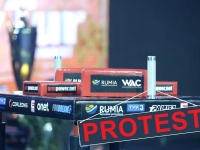Imagine a marathon run. The organizers have made a mistake and the route is longer than standard. Instead of 42,195 [forty-two kilometers and one hundred ninety five meters], we have 42,5 km. Would the competitors fall down on the ground exactly where the finish line should be? No! They will go on and reach the wrongly marked finish line. Only then will they find out what happened.
Now, let's imagine a different scenario. A marathon runner has finished a run at the right distance, crossed the finish line and is enjoying his score.
And then, a referee approaches and says “Hold on, there's been a mistake, the finish line is some three hundred meters farther away, you have to go there to win”.
Do you see what I mean?
A sportsman is capable of outdoing themselves, breaking all limits! But the bigger the effort, the lesser – after it's over – the motivation, because the body goes into rest mode.
It's easier to break one's barriers when we are still going one, than when we think we are already finished.
I am talking here about the situation that occurred at this year's Professionals' World Cup, in the left-hand women finals, 65 kg category.
But I don't want to revisit that situation, what's done is done.
My only goal here is to suggest a solution, so that situations like that never happen again.
What happened was that in the final fight one competitor has won and one has lost.
Now please, pay attention!
The speaker announces loud and clear that one competitor has won. She leaves the table. She has no reason or obligation to remain at the hall at this time. She has an hour to prepare for the awards ceremony. She can lock herself in her hotel room and open the doors to nobody! Or she can go shopping.
And most of all – she can do interviews, as the winner!
But at the same time, a protest is made at the table. On the face of it, it's all by the book, BUT ...
Who is making the protest? Who has the right to protest? A competitor or their team member?
A protest is made, and the winner is unaware of that fact.
How could this be avoided?
The solution is this – ONLY a competitor may make a protest. NO ONE ELSE!
And the protesting party MUST INFORM the other party of the protest being made!
It should look like this – the fight is over, the referees point to the winner, competitor “A”. The loser, competitor “B” makes a protest, without exiting the stage.
Let us assume that the main referee accepts their protest.
In this case, the party making the protest MUST stop their opponent on the stage! This should be their duty to their rival.
The verdict of the referee table must then be heard by BOTH parties. Otherwise the verdict shall not be valid and the score final.
Wouldn't you agree with me?
Of course this would complicate matters, were it to be implemented. But, in my opinion, this is a matter of respect for both competitors, on the side of both referees and organizers.
One more thing.
Armwrestling is not boxing, where decisions are made by the corner, not by the boxer. Only the ringside crew may decide to throw in the towel – the boxer has no say in the matter.
In armwrestling, many competitors start on their own, nobody else knows what goes on at the table. Nobody has to. So, when one contestant has a coach, this gives them a huge advantage over the other, when making protests.
PeSzy

